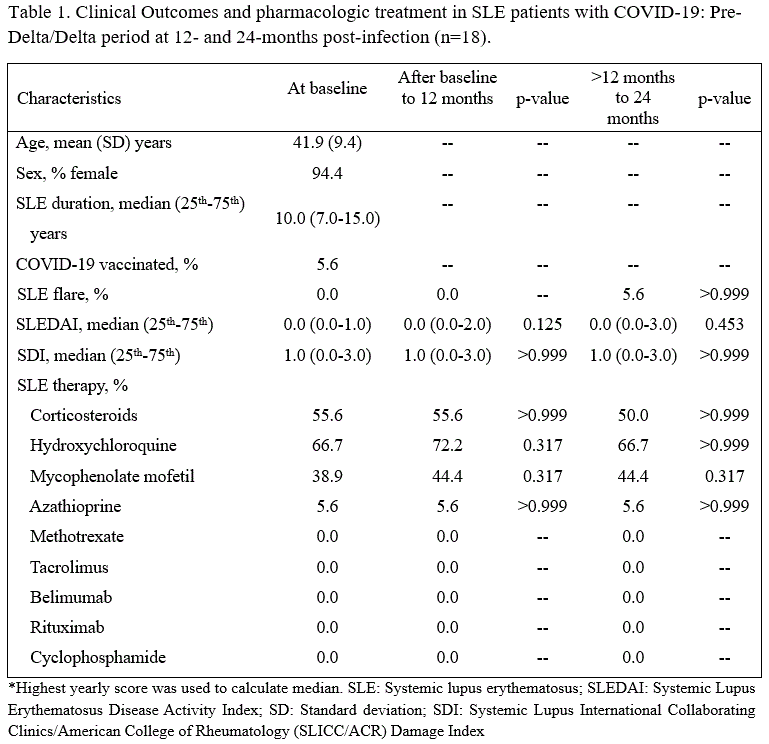Session Information
Date: Monday, October 27, 2025
Title: (1467–1516) Systemic Lupus Erythematosus – Diagnosis, Manifestations, & Outcomes Poster II
Session Type: Poster Session B
Session Time: 10:30AM-12:30PM
Background/Purpose: The post-acute sequelae of SARS-CoV-2 infection may involve low-grade inflammation, immune dysregulation, and endothelial dysfunction. Therefore, it would not be surprising if SARS-CoV-2 negatively impacts the clinical outcomes of patients with autoimmune disorders such as systemic lupus erythematosus (SLE). Previously, we reported that COVID-19 did not significantly affect the short-term outcomes of patients with SLE during the Pre-Delta/Delta and Omicron waves. Therefore, we sought to evaluate the long-term outcomes in these patient groups.
Methods: We studied a cohort of adults (≥21 years) with SLE (per 1997 American College of Rheumatology classification criteria), from a single center in Puerto Rico. Patients with confirmed COVID-19 infection during the pre-Delta/Delta (March 2020–November 2021) and the Omicron periods (December 2021–December 2022) were compared. Participants were followed at 12- and 24-month post-infection to evaluate SLE flares, disease activity (measured by the Systemic Lupus Erythematosus Activity Index), damage accrual (based on the Systemic Lupus International Collaborating Clinics/American College of Rheumatology damage index [SDI]), and lupus pharmacologic treatment. Outcomes were compared between baseline and 12- and 24-follow-up periods for pre-Delta/Delta and Omicron groups using paired analyses.
Results: A total of 148 patients with SLE were studied: 18 from the pre-Delta/Delta period and 130 from the Omicron period. None of the patients died during the follow-up. Tables 1 and 2 present demographic characteristics, SLE flares, SLEDAI scores, SDI scores, and pharmacologic therapy at the time of SARS-CoV-2 infection (baseline), as well as at 12 and 24 months. A slight but statistically significant increase in SLEDAI scores was observed at 12 and 24 months in the Omicron group. Hydroxychloroquine exposure was significantly lower in this group at 24 months. No significant differences in other outcome measures or pharmacologic treatments were noted for the study groups at 12- and 24-months post–COVID-19.
Conclusion: In this cohort of SLE patients infected with SARS-CoV-2 during the pre-Delta/Delta and Omicron periods, long-term outcomes were favorable. Aside from a slight increase in disease activity and reduced hydroxychloroquine exposure in the Omicron group, there was no increase in lupus flares, damage accrual, or use of other immunosuppressive therapies in either group.
To cite this abstract in AMA style:
Serrano-Arroyo L, Rosado-Bloise C, Vilá L. Long-Term Outcomes in Systemic Lupus Erythematosus Patients Infected with SARS-CoV-2: Variant-Specific Analysis of Pre-Delta/Delta and Omicron Periods [abstract]. Arthritis Rheumatol. 2025; 77 (suppl 9). https://acrabstracts.org/abstract/long-term-outcomes-in-systemic-lupus-erythematosus-patients-infected-with-sars-cov-2-variant-specific-analysis-of-pre-delta-delta-and-omicron-periods/. Accessed .« Back to ACR Convergence 2025
ACR Meeting Abstracts - https://acrabstracts.org/abstract/long-term-outcomes-in-systemic-lupus-erythematosus-patients-infected-with-sars-cov-2-variant-specific-analysis-of-pre-delta-delta-and-omicron-periods/


.gif)